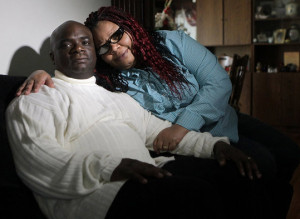![that-hurt-1450455[1]](https://www.pastalaw.com/files/2015/10/that-hurt-14504551.jpg) In recent news, an Illinois man, Joshua Spudich, pled guilty to aggravated driving under the influence and was sentenced to 11 years in prison by Kane County Judge Susan Clancy Boles. In his system, he had a mixture of five different drugs when he got behind the wheel. He then veered out of his driving lane into oncoming traffic striking a motorist which resulted in that victim’s death. Spudich attributed the incident to him taking depression medication prior to him driving. This case highlights the dangers of going behind the wheel while impaired. In representing defendants in DUI cases, the typical case involves a routine traffic stop followed by an officer’s suspicion that the driver is under the influence. That suspicion triggers the officer’s duty to conduct a field sobriety test and then ultimately a breathalyzer to determine the driver’s blood alcohol content. In New Jersey, there are strict guidelines issued by the Office of the Attorney General as to the specific procedures that must be followed in order to ensure that the officers are accurately assessing an individual’s fitness to drive. The end result is often an arrest followed by municipal court charges that result in some form of a license suspension.
In recent news, an Illinois man, Joshua Spudich, pled guilty to aggravated driving under the influence and was sentenced to 11 years in prison by Kane County Judge Susan Clancy Boles. In his system, he had a mixture of five different drugs when he got behind the wheel. He then veered out of his driving lane into oncoming traffic striking a motorist which resulted in that victim’s death. Spudich attributed the incident to him taking depression medication prior to him driving. This case highlights the dangers of going behind the wheel while impaired. In representing defendants in DUI cases, the typical case involves a routine traffic stop followed by an officer’s suspicion that the driver is under the influence. That suspicion triggers the officer’s duty to conduct a field sobriety test and then ultimately a breathalyzer to determine the driver’s blood alcohol content. In New Jersey, there are strict guidelines issued by the Office of the Attorney General as to the specific procedures that must be followed in order to ensure that the officers are accurately assessing an individual’s fitness to drive. The end result is often an arrest followed by municipal court charges that result in some form of a license suspension.
New Jersey Supreme Court Lowers Standards for Car Searches
![car-1492908[1]](https://www.pastalaw.com/files/2015/09/car-14929081.jpg) This past week the New Jersey Supreme Court has reversed itself from its prior ruling imposing greater restrictions on law enforcement conducting searches of automobiles. In its 5-2 decision, the Supreme Court relaxed this prior precedent. Under the prior decision, authorities could conduct warrantless searches if “exigent circumstances” existed. An exigent circumstance is, in lawyer legalese, is an emergency or the need to act fast in order to preserve evidence. For example, if a police officer hears screaming like someone is in distress in home, the police officer on the street does not need to obtain a search warrant from a judge to enter the home; rather, the law provides that he can enter the home without the warrant due to the emergency, i.e. the woman screaming.
This past week the New Jersey Supreme Court has reversed itself from its prior ruling imposing greater restrictions on law enforcement conducting searches of automobiles. In its 5-2 decision, the Supreme Court relaxed this prior precedent. Under the prior decision, authorities could conduct warrantless searches if “exigent circumstances” existed. An exigent circumstance is, in lawyer legalese, is an emergency or the need to act fast in order to preserve evidence. For example, if a police officer hears screaming like someone is in distress in home, the police officer on the street does not need to obtain a search warrant from a judge to enter the home; rather, the law provides that he can enter the home without the warrant due to the emergency, i.e. the woman screaming.
College Hazing: Where Traditions Clash with Criminal Law
![graduation-1311237[1]](https://www.pastalaw.com/files/2015/09/graduation-13112371.jpg) On September 2015, prosecutors in Monroe County, Pennsylvania released the gruesome details of a college hazing of a Baruch college student. The release of the grand jury transcript reveals a pledge member, Chun Hsien Deng, of the Baruch’s Delta Psi chapter, an Asian American cultural fraternity, was made to wear a blindfold and a 30 pound backpack along with other would-be fraternity members during a pledging in Pennsylvania. Deng, along with other pledge members, were then forced to run “the Gauntlet,” wherein members of the fraternity would form two lines and have the new pledges run down it while being struck by members on both sides. Deng reportedly received the severest of beatings and suffered blunt trauma injuries as the pledging escalated. He ultimately died of those injuries. Fraternity members then attempted to hide and destroy evidence. Five Baruch college students now face murder charges.
On September 2015, prosecutors in Monroe County, Pennsylvania released the gruesome details of a college hazing of a Baruch college student. The release of the grand jury transcript reveals a pledge member, Chun Hsien Deng, of the Baruch’s Delta Psi chapter, an Asian American cultural fraternity, was made to wear a blindfold and a 30 pound backpack along with other would-be fraternity members during a pledging in Pennsylvania. Deng, along with other pledge members, were then forced to run “the Gauntlet,” wherein members of the fraternity would form two lines and have the new pledges run down it while being struck by members on both sides. Deng reportedly received the severest of beatings and suffered blunt trauma injuries as the pledging escalated. He ultimately died of those injuries. Fraternity members then attempted to hide and destroy evidence. Five Baruch college students now face murder charges.
Excessive Force Used by Law Enforcement: What if It Happens to You?
![arrested-1436680[1]](https://www.pastalaw.com/files/2015/09/arrested-14366801.jpg) On September 8, 2015, Santa Clara California sheriff’s officers arrested a man, Jose Salazar, for riding his bicycle without a functioning headlight. In effectuating the arrest, officers allegedly slammed Salazar to the ground and then kneed and kicked him. Salazar suffered a broken elbow and forearm along with other injuries to his face and back. Salazar maintains that he complied with officers in stopping and showing his hands while fully surrendering by lying spread eagle on the ground. Despite his capitulation, the officers are alleged to have used excessive physical force on him and then altered the arrest reports to cover up the incident. Salazar retained an attorney who has filed a lawsuit seeking compensation and punitive damages against the sheriff’s office for the officers’ alleged use of excessive force.
On September 8, 2015, Santa Clara California sheriff’s officers arrested a man, Jose Salazar, for riding his bicycle without a functioning headlight. In effectuating the arrest, officers allegedly slammed Salazar to the ground and then kneed and kicked him. Salazar suffered a broken elbow and forearm along with other injuries to his face and back. Salazar maintains that he complied with officers in stopping and showing his hands while fully surrendering by lying spread eagle on the ground. Despite his capitulation, the officers are alleged to have used excessive physical force on him and then altered the arrest reports to cover up the incident. Salazar retained an attorney who has filed a lawsuit seeking compensation and punitive damages against the sheriff’s office for the officers’ alleged use of excessive force.
Judge Joe Brown Contempt Case: A lesson in Deference to the Court
![gavel-2-1236453[1]](https://www.pastalaw.com/files/2015/09/gavel-2-12364531.jpg) Judge Joe Brown, reality TV Judge, whose show aired from 1998 to 2013 was recently released after serving a 5 day jail sentence in Tennessee. The sentence stemmed from a courtroom incident in March 2014 in which Brown, now a lawyer in private practice, was representing a client in a child support hearing in Tennessee. An argument erupted between Brown and court employees over the case not being on the day’s calendar of cases. Brown ignored the judge’s order that he quite down, and after he refused, the judge found him in contempt of court and sentenced him to 5 days in jail.
Judge Joe Brown, reality TV Judge, whose show aired from 1998 to 2013 was recently released after serving a 5 day jail sentence in Tennessee. The sentence stemmed from a courtroom incident in March 2014 in which Brown, now a lawyer in private practice, was representing a client in a child support hearing in Tennessee. An argument erupted between Brown and court employees over the case not being on the day’s calendar of cases. Brown ignored the judge’s order that he quite down, and after he refused, the judge found him in contempt of court and sentenced him to 5 days in jail.
The Owen Labrie Trial: Electronic Discovery Makes or Breaks a Case
 On August 28, 2015, a New Hampshire jury convicted Owen Labrie, a former prep school student at the prestigious Saint Paul’s preparatory high school, of one felony charge and several misdemeanor sexual assault and child endangerment charges against a 15 year old victim who was a freshman at that school while Labrie was a senior. The jury acquitted Labrie of the more serious aggravated felony sexual assault which carries 10 to 20 years in jail. Nonetheless, the jury found him guilty of the felony charge related to his use of an online service or the internet to solicit a minor under the age of 16 for the purposes of sex. In total, Labrie faces a maximum of 11 year in prison in addition to inclusion in the sex offender registry.
On August 28, 2015, a New Hampshire jury convicted Owen Labrie, a former prep school student at the prestigious Saint Paul’s preparatory high school, of one felony charge and several misdemeanor sexual assault and child endangerment charges against a 15 year old victim who was a freshman at that school while Labrie was a senior. The jury acquitted Labrie of the more serious aggravated felony sexual assault which carries 10 to 20 years in jail. Nonetheless, the jury found him guilty of the felony charge related to his use of an online service or the internet to solicit a minor under the age of 16 for the purposes of sex. In total, Labrie faces a maximum of 11 year in prison in addition to inclusion in the sex offender registry.
The Development of a Plea Deal: The Jared Fogle Case
 Jared Fogle, formerly Subway’s public spokesman, pled guilty this past week in federal court to multiple counts of child porn charges. This includes engaging in sex with minors on multiple occasions. In exchange for his plea deal the prosecutor has agreed not recommend more than 12 and one-half years in prison. This shocking revelation yields an important question about the adequacy of plea deals and how they come about in the criminal justice system.
Jared Fogle, formerly Subway’s public spokesman, pled guilty this past week in federal court to multiple counts of child porn charges. This includes engaging in sex with minors on multiple occasions. In exchange for his plea deal the prosecutor has agreed not recommend more than 12 and one-half years in prison. This shocking revelation yields an important question about the adequacy of plea deals and how they come about in the criminal justice system.
Post-Conviction Relief: The Rodney Roberts Success Story
 After 17 years of incarceration and numerous filings and litigation with the New Jersey appellate courts that Rodney Roberts receive the answer he sought for so many years on post-conviction relief: not guilty, conviction vacated. This was a long journey, fraught with both set-backs and victories that led to the ultimate successful result to release Mr. Roberts from a crime he did not commit. I had the pleasure to represent him. His story is an inspiration to those who have been wrongfully convicted and seek redress in New Jersey for post-conviction relief under New Jersey Court Rule 3:22-1 et. seq.
After 17 years of incarceration and numerous filings and litigation with the New Jersey appellate courts that Rodney Roberts receive the answer he sought for so many years on post-conviction relief: not guilty, conviction vacated. This was a long journey, fraught with both set-backs and victories that led to the ultimate successful result to release Mr. Roberts from a crime he did not commit. I had the pleasure to represent him. His story is an inspiration to those who have been wrongfully convicted and seek redress in New Jersey for post-conviction relief under New Jersey Court Rule 3:22-1 et. seq.
The Tsarnaev case: Reviving the Massachusetts Death Penalty
 The shocking and horrific acts of terrorism committed by convicted defendant, Dzhkohar Tsarnaev, in the Boston Marathon bombing have revived discussions of the applicability of the death penalty in Massachusetts. The Commonwealth of Massachusetts and New England has always been at the forefront of great legal scholarship, has been home to some of this nations most respected legal minds, such as John Adams, Daniel Webster, and Alan Dershowitz. For the majority of its history the death penalty was part of its history, yet in 1984 the death penalty in Massachusetts was abolished. Despite attempts to revive it, most recently by former Governor Mitt Romney, the death penalty has had no place in Massachusetts since 1984.
The shocking and horrific acts of terrorism committed by convicted defendant, Dzhkohar Tsarnaev, in the Boston Marathon bombing have revived discussions of the applicability of the death penalty in Massachusetts. The Commonwealth of Massachusetts and New England has always been at the forefront of great legal scholarship, has been home to some of this nations most respected legal minds, such as John Adams, Daniel Webster, and Alan Dershowitz. For the majority of its history the death penalty was part of its history, yet in 1984 the death penalty in Massachusetts was abolished. Despite attempts to revive it, most recently by former Governor Mitt Romney, the death penalty has had no place in Massachusetts since 1984.
 New Jersey Criminal Lawyer Blog
New Jersey Criminal Lawyer Blog


